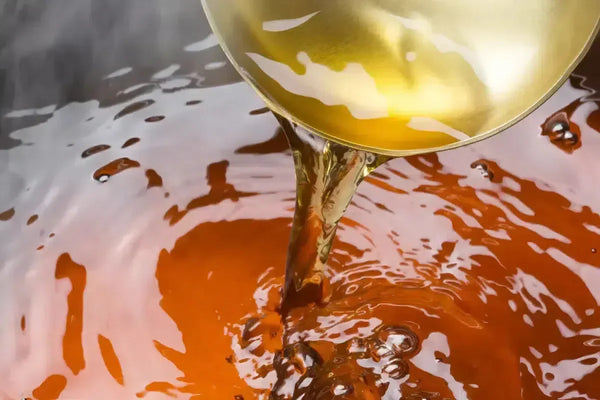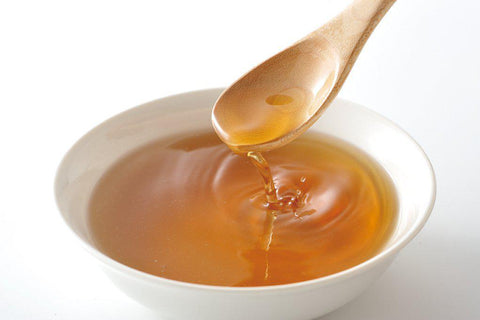
Jump to:
It’s no secret that shiro dashi was originally exclusively for professional chefs and its taste was available at exclusive Japanese restaurants only. However, in response to the growing demand for shiro dashi among ordinary consumers, it got marketed in groceries in Japan, and eventually overseas. Shiro dashi is a must-have item if you are becoming fond of Japanese cuisine at home. In this article, we will provide some basic information on shiro dashi including:
- What is shiro dashi?
- The ingredients of shiro dashi
- What does it taste like?
- How is shiro dashi used?
- Guidance for homemade shiro dashi
- Advantages of using shiro dashi instead of normal soy sauces
- Our recommended shiro dashi

What is Shiro Dashi?
Shiro dashi, translated as white soup stock, is generally made with shiro shoyu or usukuchi shoyu, dashi, salt, mirin sweet sake, and cooking sake. The liquid is translucent and the color is light brown or amber-like. Unlike most soy-sauce-based seasonings this condiment is useful for deepening the flavor without turning it brown.
Shiro dashi is often contrasted with mentsuyu soup base because both of them have the same role as a condiment. One of the most distinctive differences between shiro dashi and mentsuyu is that the former is saltier and has a simpler aftertaste while the latter is sweeter and richer. Check this article if you wish to learn more about mentsuyu.

What is Shiro Dashi Made of?
The production methods of shiro dashi vary between manufacturers, but they commonly use shiro shoyu (pale amber-colored soy sauce) or usukuchi shoyu (light brown soy sauce) as a base ingredient, then mix it with condiments including salt, sake, and mirin. After this mixing process, they simmer it with dashi ingredients such as kombu seaweed, dried bonito flakes, and shiitake mushrooms. Some makers produce shiro dashi which has a stock of shellfish like scallop or clam, dried tuna flakes, and ago (flying fish).

The Taste of Shiro Dashi - Mixture of Saltiness and Umami
Since shiro dashi has a lighter color than mentsuyu sauce, you may imagine that its taste is also lighter, but in fact it’s the opposite. What you need to keep in mind with this condiment is that it's actually saltier than mentsuyu. However, shiro dashi usually has a simpler flavor and more refreshing aftertaste, so it’s easy to eat. If you don’t want to make your dish too robust, shiro dashi is the better choice for you.
How to Use and Store Shiro Dashi?
Shirodashi is designed to enrich the flavor of food without changing its original color. For this reason, it pairs particularly well with tamagoyaki (Japanese rolled omelet), chawanmushi (Japanese savory egg custard), osuimono (Japanese clear soup), and more.

This soup base goes perfectly with any Japanese cuisine, but what you may not know is it also pairs nicely with Western and Chinese cuisines. For instance, olive oil, citrus juice, herb dishes, and white cream with consomme are great companions of shiro dashi. Likewise, ankake chahan (fried rice with starchy sauce), Chinjao Rosu (stir fried pepper steak), and paitan soup (chicken white broth) are major Chinese dishes that go excellently with shiro dashi.

Regarding its storage, make sure to refrigerate it once opened. Depending on the products, shiro dashi lasts between 2 weeks and 1 month, so it’s highly recommended to consume it all as soon as possible. Avoid using it if there’s an unpleasant smell of fermentation or if the liquid looks cloudy.
Shiro Dashi Recipes
In this section, we would like to introduce how to make homemade shiro dashi. First, here are the ingredients:
- 400ml of water
- 100ml shiro soy sauce (extra light soy sauce) or usukuchi soy sauce (light soy sauce)
- 100ml mirin (it’s okay to replace with white wine if you don’t have it)
- 5~10g dried kombu seaweed (FYI, 10cm × 10cm dried kombu weighs approximately 10g)
- 10g bonito flakes

If you can’t prepare real dashi ingredients, it’s okay to use powdered dashi instead. Also, if you prefer a sweet taste, add more mirin or sugar according to your preferences. Next, the following is step-by-step guidance for cooking this condiment:
- Put water and kombu into a pot and leave it for 10 minutes.
- Add soy sauce and mirin to the pot and boil it to evaporate alcohol.
- When the mixture is boiled, keep heating on medium heat for a minute.
- Turn off the heat, add bonito flakes, and let them soak for 10 minutes. If you need a stronger dashi flavor, you can leave it for 20 ~ 30 minutes.
- Transfer the mixture to a mesh strainer and strain it. Do not squeeze the bonito flakes or it may smell fishy.
In most cases, dried kombu leaves a white powdery residue on its surface; this is umami content and is non-toxic so you don’t have to rinse it. However, in case there are white objects that are spongy and smell moldy, avoid using that kombu.
What are the Benefits of Using Shiro Dashi?
There are many benefits of using shiro dashi for cooking. First of all, shiro dashi can be rephrased as a dashi-flavored soy sauce, and umami can enhance the flavor of foods. In addition, shiro dashi itself already contains various seasonings including soy sauce, salt, mirin, sugar, sake, and so on. For these reasons, shiro dashi is a perfectly prepared food that means you do not need to prepare any other seasonings.
As mentioned earlier, shiro dashi has a lighter color than normal soy sauces, which means you can prevent your food from turning brownish. In some cases, monotone foods are less likely to stimulate your appetite; a dark-colored tamagoyaki omelet may look less delicious than its unseasoned yellow counterpart. Thus, shiro dashi may be more suitable than mentsuyu and soy sauce in terms of decorating the dishes.
The richness of umami can make your cooking more efficient. Making dashi by yourself is the best way to enjoy Japanese cuisine but it is also true that creating homemade dashi may be burdensome and time-consuming. On the other hand, since shiro dashi is a prepared dashi condiment, you can instantly add umami by simply adding a tablespoonful of it. It's not merely a dashi seasoning; it also makes your cooking smarter.

Bring Japanese Flavors to Your Kitchen
Shiro dashi is an essential ingredient for simplifying and enhancing Japanese cooking. Whether you're preparing tamago-yaki, miso soup, udon, or simmered dishes, a small amount of shiro dashi brings a rich depth of flavor with minimal effort.
If you’re new to shiro dashi or looking for the best options available, we’ve selected five top-quality shiro dashi products that deliver balanced umami flavors from bonito, kombu, and other premium ingredients. These highly rated options will help you elevate your Japanese cooking with ease!
4 comments
Hi Paris,
Since shiro dashi is more concentrated and seasoned with soy sauce and mirin, you might need to adjust the saltiness and sweetness when using dashi paste. Start with 2 tbsp of dashi paste, taste, and add more if necessary.
Let me know how it turns out!
Japanese Taste,
Hello Down,
Simply dilute it with water using the following ratios:
For soups: 1 part dashi to 9 parts water.
For noodle soups (udon, soba, etc.): 1 part dashi to 7 parts water.
Hope this helps!
Japanese Taste,
Hi, I use Shiro for plant based cheese making and I have ran out of Shiro paste. How much Dashi paste can substitute one table spoon of Shiro. Thank you
Paris,
I have Jonetz Shiro Dashi liquid, and have no idea what the ratio for Dashi liquid to Water would be for Miso Soup, can anyone help with this? Thanks.
Down Punxx,